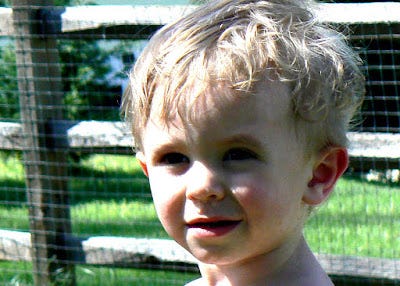The difference between then and now
A few weeks ago, Noah and I were driving somewhere and listening to Coldplay's Viva la Vida.
"This CD reminds me of our trip to Baltimore," he said.
"Why?" I asked.
"You don't remember?" I didn't. "We listened to it the whole way there and back."
I had no memory of music.
During that trip, I realized with certainty that something was seriously wrong. The foremost hint was at a lunch of fish and chips overlooking the Inner Harbor, when I cried uncontrollably into my plate because Noah had timestamped a photo I intended to use in print for my then-employer's Maryland guide.
"Did you think I was acting crazy?" I asked him a couple nights ago when that trip reappeared in conversation.
"No. Back then I was the kind of person who thought I was doing something wrong."
"But now we know you weren't doing anything wrong," I admitted with uncharacteristic generosity.
"Right. Turns out, you were crazy," he replied triumphantly.
"Do you wish you had married somebody else?"
"Nah. Everybody has their neuroses," he said.
"True." I took a moment to reflect on Noah's uncharacteristic insight.
"I'm glad it's yours I have to live with," he said tenderly.
What could I do but laugh.
* * *
Although I was diagnosed with postpartum depression, the "postpartum" describes the onset rather than the extent. Ethan is nearly 2 1/2 now, but I still take medication daily to regulate what had become a daily—sometimes hourly—fluctuation between feeling angry and feeling almost nothing. Those first few months after Ethan was born were happy but not pleasurable, and that fact had nothing to do with the fragrant, tiny angel I nursed every evening after work. One night as I sat rocking Ethan, Noah lying on the floor at my feet, I began to cry because I could think the words, "I am happy," but I couldn't feel them. Luckily my particular mental illness is mild and didn't affect my sense of reality, just my full participation in it.
I still have occasional "bad" times. But I can maintain clarity, which is the difference between then and now, and I'm usually back on track within just a day or two.
Dealing with mental illness (and don't think I'm not aware of the stigma associated with that term, but I'm determined to use it in hopes of abating the stigma) has had its positives, I guess. Mainly I'm much more in tune with my emotional fluctuations, so I can be proactive about living life to enjoy it. But I also hold a different view toward parenting a toddler. In moments when I feel overwhelmed by Ethan acting out or being disobedient or challenging my authority—in short, while he's awake—I remember that the truth is, he's not having a hard time. I am. He is exactly where he needs to be as a toddler exploring the burgeoning limits of independence. It's actually easier to deal with knowing that a day's emotional climate is ultimately in my hands.
When I was little, we had this movie called Rigoletto (Feature Films for Families, holla!). Even after all these years, one line so profoundly affected me I still remember it. Ribaldi, the angry and hermetic yet musically inspired protag, tells a young boy dealing with a difficult situation to "change the way you feel." It is that simple, but it's never easy.
* * *
Tonight I sat at my desk looking out the window into our rather verdant backyard. I watched while a (nude) Ethan ran around squealing and laughing as Noah sprayed his feet with the hose and doused him in sudden "rain showers."

After a few minutes of observing, I stood up and joined them.
